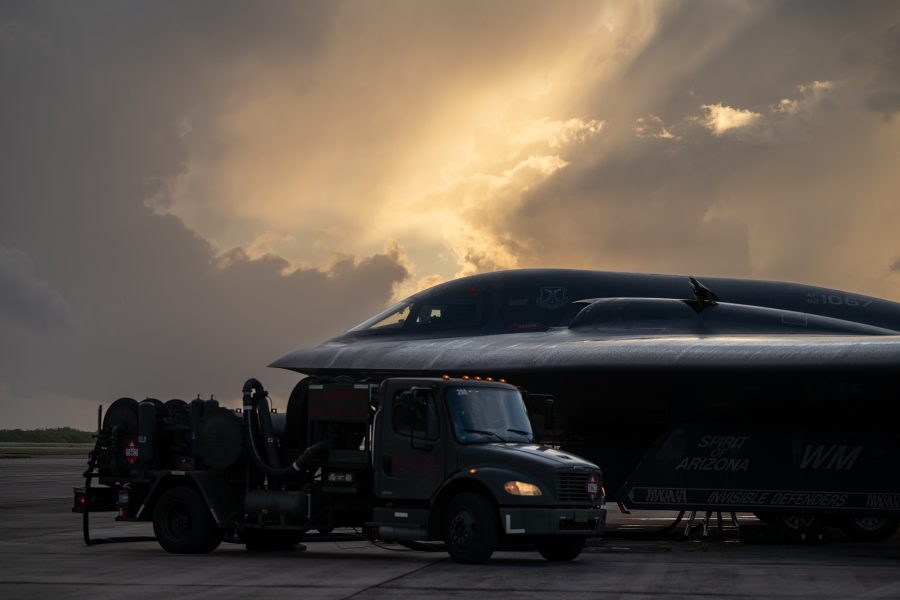The U.K. and the U.S. will continue to enjoy access to the ports, airfield, and workshops at Diego Garcia in the Indian Ocean for at least another century, under a deal inked between the U.K. and Mauritius May 22.
The agreement transfers sovereignty over the Chagos Archipelago—of which Diego Garcia is the largest island—to Mauritius, but permits the U.K. and U.S. continued exclusive access to the military infrastructure on the island for another 99 years, with an option for 40 years more beyond that. The U.K. government said the deal, which also includes an annual lease payment and Mauritius agreeing not to allow any interference with base operations, was essential to keep “adversary” nations from establishing a presence in the archipelago.
Although America was not a signatory to the agreement, U.S. officials praised the deal, and the British government highlighted the important role the base plays for one of its closest allies.
“Diego Garcia is a vital military base for the U.S.,” Defense Secretary Pete Hegseth said in a post on X. “The U.K.’s (very important) deal with Mauritius secures the operational capabilities of the base and key U.S. national security interests in the region. We are confident the base is protected for many years ahead.”
The State Department also heralded the deal.
Secretary of State Marco Rubio said that following “a comprehensive interagency review,” the Trump administration feels that “this agreement secures the long-term stable and effective operation of the joint U.S.-U.K. military facility at Diego Garcia,” he said in a statement. “Although the United States is not a party to this agreement, we remain responsible for operating the U.S. Naval Support Facility on Diego Garcia, which continues to play a vital role in supporting forward-deployed operational forces and advancing security across the region,” he said. Rubio said the deal was discussed between Trump and U.K. Prime Minister Kier Starmer at the latter’s recent visit to the White House
The facilities at Diego Garcia have been used and upgraded by the U.S. and U.K. for the last 50 years, at which time the local residents were forced off the island to make way for military construction. It saw heavy utilization as an operating location and waystation for U.S. bombers, intelligence, surveillance and reconnaissance aircraft, fighters, aerial tankers, and other platforms during the 1991 and 1993 Gulf Wars and throughout the war in Afghanistan. It is a routine operating location during peacetime, but with rotational forces.
The Navy also has extensive berthing capabilities at the island, which can handle nuclear submarines and elements of a carrier battle group.
The Air Force positioned six B-2 bombers at Diego Garcia between March and May, marking the longest and largest overseas deployment for the stealth bomber, during which some of the aircraft conducted strikes against Houthi targets in Yemen, in what Washington may also have meant as a message to Iran, as the the base is some 2,600 miles from Tehran. The stealth bombers were swapped out for B-52s earlier this month. The U.S. also recently deployed F-15s to the island to protect it.
The Air Force positioned four inflatable, environment-controlled hangars at the base to permit maintenance of the B-2’s stealth coatings during the deployment.
A U.K. Ministry of Defense press release said the location is “strategically critical” and “irreplaceable” to the U.K. and U.S.,
The base’s availability to allied nations has been “one of our most significant contributions to the transatlantic defense and security partnership,” the British MOD said. The agreement “ensures its continued operation for at least the next century, protecting capabilities essential to U.K. intelligence and counter-terrorism.”
The MOD also called the facility a “critical logistics hub” in the region, and forces based there “protect vital shipping lanes.”
The deal calls for the U.K. to pay Mauritius about $140 million a year as a lease on the island, and permits Chagossians relocated from the island group by Britain in 1975 to return to all of the islands except Diego Garcia. There will also be development grants of varying amounts from U.K. agencies, collectively worth about $5 billion.
In addition to a deep-water port and extended runway, Diego Garcia hosts “advanced communications and surveillance capabilities,” the MOD said, “which have played a key role in missions to disrupt high-value terrorists, including Islamic State threats to the U.K.”
Negotiations over the base have been underway for two years.
The British government said that not just the U.S. and the U.K. will benefit.
“Crucially, all Five Eyes partners—the U.S., Canada, Australia, and New Zealand—back the agreement, along with India, recognizing the critical role Diego Garcia plays in upholding global stability and deterring adversaries,” the MOD said.
“As the world becomes more dangerous, our military base on Diego Garcia becomes more important,” said U.K. Defense Minister John Healy. “Without this base, our ability to deter terrorists, defend our interests, and protect our troops around the world would be at risk. This agreement will safeguard our national and economic security for generations to come.”
The MOD also said the deal allows the U.K. to retain control of, and continue to operate, “the electromagnetic spectrum satellite used for communications, vital for countering hostile interference.” The base hosts a ground antenna for the Global Positioning System and part of Space Force’s Ground-Based Electro-Optical Deep Space Surveillance (GEODSS) system. The island also employs nuclear test ban monitoring equipment.
As part of the deal, Mauritius agreed to a 24-nautical-mile buffer zone around the island “where nothing can be built or placed without U.K. consent,” the MOD noted. No “activities” will be permitted on the neighboring islands—some more than 50 miles away—that would disrupt base operations, and no development can take within the archipelago without “a rigorous process of joint decision-making” and U.K. approval.
Moreover, there will be “a strict ban on foreign security forces on the outer islands, whether civilian or military,” and a “binding obligation” that the base “is never undermined.”
The MOD said agreeing to the treaty was a must, otherwise “the land, sea and air operations of the base would become inoperable; doing nothing was not an option.” It also said that the deal “was the only route to securing the future of the base and preventing the U.K.’s adversaries from establishing a presence in the region.”
The base has played host to units from Australia, France, Japan, and South Korea.
Various international courts and tribunals have indicated that the U.K. could not continue its sovereignty over the Chagos Archipelago, and that London has determined “the U.K. would not have a realistic prospect of successfully defending its legal position on sovereignty” in litigation, the U.K. Foreign Ministry said.
The Chagos Archipelago has a population of about 4,000 people. It was separated from Mauritius by the U.K. in 1965 and purchased for about $4 million, but Mauritius has successfully argued in international court that it was forced to cede the islands as the price of independence from the U.K.




